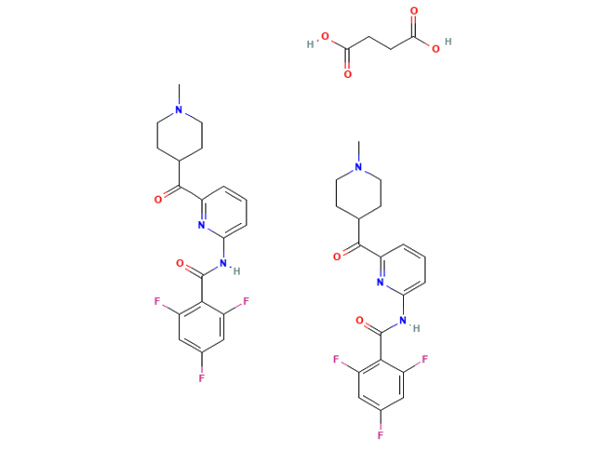Here's an overview of lasmiditan succinate
2024-04-09
Lasmiditan succinate is a medication used for the acute treatment of migraine headaches with or without aura in adults. It belongs to a class of drugs called serotonin (5-HT) 1F receptor agonists, also known as "ditans." Lasmiditan works by selectively activating serotonin receptors in the brain, which leads to the inhibition of neurogenic inflammation and pain signaling pathways associated with migraines. Here's an overview of lasmiditan succinate:
1. Indications: Lasmiditan succinate is indicated for the acute treatment of migraine with or without aura in adults. It is not indicated for the preventive treatment of migraine or for the treatment of other types of headaches.
2. Mechanism of Action: Lasmiditan succinate selectively binds to and activates serotonin (5-HT) 1F receptors, which are located in the trigeminal system of the brain. Activation of these receptors inhibits the release of neuropeptides involved in migraine pathophysiology, such as calcitonin gene-related peptide (CGRP), thereby reducing migraine symptoms such as headache pain and associated symptoms like nausea and sensitivity to light and sound.
3. Administration: Lasmiditan succinate is available in oral tablet form and is typically taken as a single dose at the onset of a migraine attack. The recommended dosage is usually 50 mg, 100 mg, or 200 mg, depending on the severity of the migraine and individual patient response. It can be taken with or without food.
4. Adverse Effects: Common adverse effects associated with lasmiditan succinate include dizziness, fatigue, sedation, paresthesia (tingling or numbness), and dry mouth. These side effects are usually mild to moderate in severity and transient. Less common but potentially serious adverse effects may include serotonin syndrome (particularly when used in combination with other serotonergic medications), central nervous system depression, and cardiac events. Patients experiencing severe or persistent side effects should seek medical attention.
5. Contraindications: Lasmiditan succinate is contraindicated in patients with ischemic heart disease, history of stroke or transient ischemic attack (TIA), or uncontrolled hypertension. It should not be used concomitantly with other 5-HT1 receptor agonists or with potent CYP3A4 inhibitors due to the risk of serotonin syndrome and cardiovascular events.
6. Special Populations: Lasmiditan succinate should be used with caution in patients with hepatic impairment, as the drug is primarily metabolized in the liver. Dosage adjustments may be necessary in patients with moderate to severe hepatic impairment. It is not recommended for use in pregnant or breastfeeding women due to limited safety data.
7. Storage: Lasmiditan succinate tablets should be stored at room temperature (between 20°C and 25°C) in a dry place away from moisture and heat. The tablets should be kept in their original packaging and out of reach of children.
Lasmiditan succinate offers an alternative treatment option for migraine sufferers who do not respond well to or cannot tolerate other acute migraine medications. However, it's essential to use it as directed by a healthcare professional and to be aware of the potential risks and side effects associated with its use.



